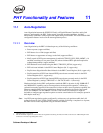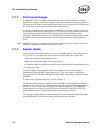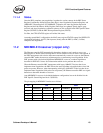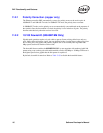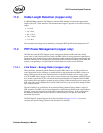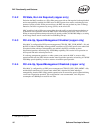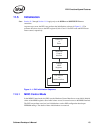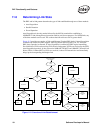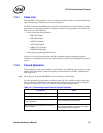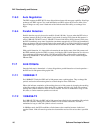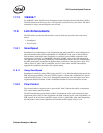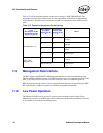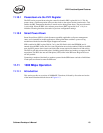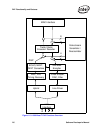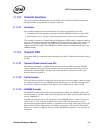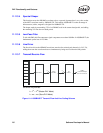
Software Developer’s Manual 195
PHY Functionality and Features
11.6.1 False Link
When the PHY is first powered on, reset, or encounters a link down state, it must determine the line
speed and operating conditions to use for the network link.
The PHY first checks the MDIO registers (initialized via the Hardware Control Interface or written
by software) for operating instructions. Using these mechanisms, programmers can command the
PHY to do one of the following:
• Force twisted-pair link operation to:
— 1000T Full Duplex
— 1000T Half Duplex
— 100TX, Full Duplex
— 100TX, Half Duplex
— 10BASE-T, Full Duplex
— 10BASET, Half Duplex
• Allow Auto-Negotiation/parallel-detection.
In the first six cases (forced operation), the PHY immediately begins operating the network
interface as commanded. In the last case, the PHY begins the Auto-Negotiation/parallel-detection
process.
11.6.2 Forced Operation
Forced operation can be used to establish 10 and 100 links, and 1000 links for test purposes. In this
method, Auto-Negotiation is disabled completely and the link state of the PHY is determined by
PHY register 0d.
Note: When speed is forced, the MDI/MDI-X crossover feature is not functional.
In forced operation, the programmer sets the link speed (10, 100, or 1000) and duplex state (full or
half). For Gigabit (1000) links, the programmer must explicitly designate one side as the Master
and the other as the Slave. Table 10-1 summarizes link establishment procedures.
Table 10-1. Determining Duplex State Via Parallel Detection
Configuration Result
Both sides set for Auto-Negotiate. Link is established via Auto-Negotiation.
Both sides set for forced operation. No problem as long as duplex settings match.
One side set for Auto-Negotiation and the other for
forced, half-duplex.
Link is established via parallel detect.
One side set for Auto-Negotiation and the other for
forced full-duplex.
Link is established; however, sides disagree, resulting
in transmission problems. Forced side is full-duplex,
Auto-Negotiation side is half-duplex.



